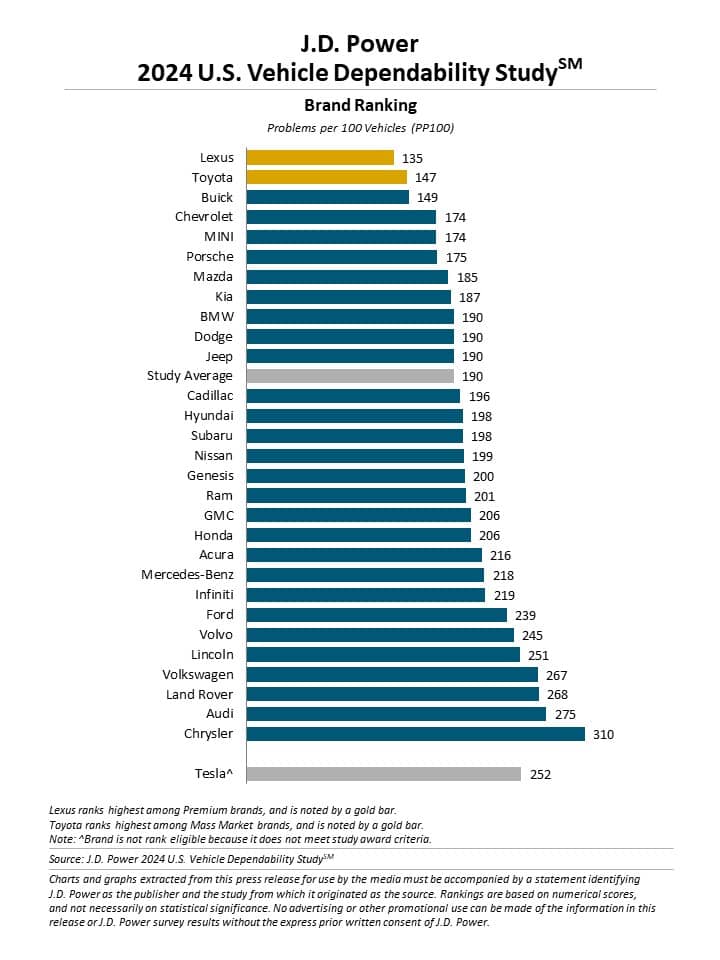
“However, that is not the case. Increased problem levels are experienced across multiple driver assistance features including, but not limited to, lane departure warning/lane keeping assistance and forward collision warning/automatic emergency braking.”
“Historically, VDS model results mirror the results of the respective model year in the J.D. Power Initial Quality Study, so a deterioration of vehicle dependability is unusual,” said Frank Hanley, senior director of auto benchmarking at J.D. Power. “This can likely be attributed to the tumultuous time during which these vehicles were built, and owners are keeping their vehicles for much longer. In fact, the average age of vehicles on American roads today is approximately 12 years, which underscores the importance of building a vehicle designed to stand the test of time. Automakers must ensure new vehicle technology introduced today will still meet the customer’s needs years down the road.”
The study, now in its 35th year, covers 184 specific problem areas across nine major vehicle categories: climate; driving assistance; driving experience; exterior; features/controls/displays; infotainment; interior; powertrain; and seats.
Following are key findings of the 2024 study:
- Infotainment system woes continue to plague owners: As vehicles roll off the assembly line with increasingly more technology, it is not unexpected that the most problematic vehicle category is infotainment (49.1 PP100)—nearly twice as many problems as the next-highest category, which is exterior. Among infotainment issues, Android Auto and Apple CarPlay connectivity (6.3 PP100) is the top problem, followed by built-in voice recognition (6.1 PP100).
- Annoyance with driver assistance alerts grows over time: The number of problems related to driver assistance system alerts has increased between the 90-day ownership period and the three-year ownership period. “Many would think that after three years, owners would become used to the alerts on their vehicle,” Hanley said. “However, that is not the case. Increased problem levels are experienced across multiple driver assistance features including, but not limited to, lane departure warning/lane keeping assistance and forward collision warning/automatic emergency braking.”
- Electrified vehicles more problematic than others: Owners of battery electric vehicles (BEVs) and plug-in hybrid electric vehicles (PHEVs) experience more problems than owners of gas-powered and hybrid vehicles. BEVs are most troublesome (256 PP100), followed by PHEVs (216 PP100). Hybrids (191 PP100) and gasoline vehicles (187 PP100) fare significantly better. At three years of ownership, tires are a sore spot for BEVs, with 39% of owners saying they replaced tires in the past 12 months—19 percentage points higher than owners of gas-powered vehicles.
- Toyota Motor Corporation wins most segment awards: Toyota Motor Corporation’s nine segment awards is the most received by any automaker since 2017 when the Japanese automaker received 10 awards.
- The most improved brands: The top three brands showing the greatest improvement in the number of problems are Porsche (33 PP100 improvement); Mercedes-Benz (22 PP100 improvement); and Toyota (21 PP100 improvement).
Highest-Ranked Brands
Lexus ranks highest overall in vehicle dependability for a second consecutive year, with a score of 135 PP100. Among premium brands, Porsche (175 PP100) ranks second and BMW (190 PP100) ranks third.
Toyota ranks highest in the mass market segment, with a score of 147 PP100. Buick (149 PP100) ranks second, while Chevrolet (174 PP100) and MINI (174 PP100) each rank third in a tie.
The parent corporation receiving the most model-level awards is Toyota Motor Corporation with nine: Lexus ES, Lexus IS, Lexus NX, Lexus RX, Toyota 4Runner, Toyota Camry, Toyota Corolla, Toyota Tacoma and Toyota Tundra. General Motors Company receives four segment awards for Buick Encore, Chevrolet Equinox, Chevrolet Traverse and Chevrolet Tahoe. BMW AG receives two segment awards for BMW X1 and BMW X6.
The 2024 U.S. Vehicle Dependability Study is based on responses from 30,595 original owners of 2021 model-year vehicles after three years of ownership. The study was fielded from August through November 2023.
To learn more about the U.S. Vehicle Dependability Study, visit https://www.jdpower.com/business/automotive/us-vehicle-dependability-study.